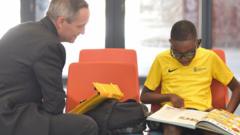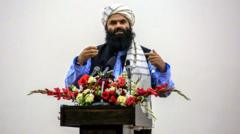As Afghan students at the American University of Afghanistan in Qatar grapple with the anxiety of potential forced repatriation to their homeland, the implications of U.S. policy under the Trump administration exacerbate their fears of oppression, particularly for women.
Afghan Students in Qatar Face Uncertain Future Amid U.S. Aid Cuts

Afghan Students in Qatar Face Uncertain Future Amid U.S. Aid Cuts
Afghan students studying in Qatar encounter fears of being forced back to Taliban-ruled Afghanistan due to the cessation of aid and changes in U.S. immigration policy.
In the heart of Doha, Qatar, students from the American University of Afghanistan find themselves plunged into uncertainty. After fleeing the Taliban's rule in their homeland—a regime that has rendered women's education illegal—these students now grapple with an existential threat as U.S. aid and refugee resettlement policies shift dramatically.
Nilab, a 30-year-old Afghan student, embodies the plight of many. She meticulously writes her worries on slips of paper and affixes them to the walls of her dorm room in a reflective effort to maintain her mental health. "How can girls go back to Afghanistan?" she questions, haunted by the grim reality that awaits if she's forced to return. The shutdown of foreign aid and the suspension of refugee admissions by the Trump administration have intensified her fears.
President Trump's executive order on January 20, 2025, which paused the processing of refugee claims, shattered Nilab's hope of reuniting with her family who successfully sought asylum in the United States following the Taliban takeover. As she pursues her cybersecurity degree amid these mounting pressures, the reality is stark. She faces the possibility of being stripped of her rights and subjected to violence, including forced marriage—fears shared by her peers, Faisal Popalzai and Hashmatullah Rahimi.
The implications for these students extend beyond anxiety; they represent the lives of many who fled tyranny for the promise of safety and education. The support system that once buoyed their aspirations now hangs in the balance, leading to a painful contemplation of their uncertain futures. As their educational endeavors continue in exile, the possibility of betrayal lingers, overshadowing their ambitions. The question echoes in their community: What will become of us if we are forced to return?





















